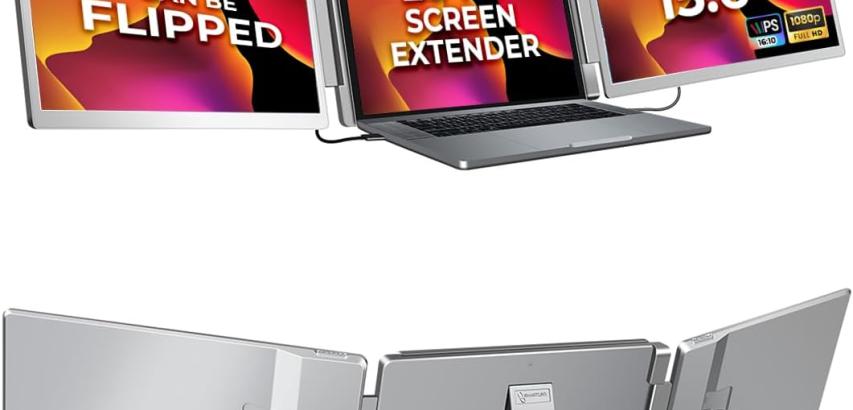A laptop screen extender is a portable secondary display that connects to your laptop to expand screen real estate, enabling multitasking, improved workflow, and enhanced visual clarity. Ideal for remote workers, students, gamers, and creatives, these devices transform your laptop into a versatile dual-screen setup without the bulk of traditional monitors.
Key Features and Technology
Portability:
Lightweight, slim designs (often under 2 lbs / 1 kg) with built-in stands or magnetic attachments for easy transport.
Connectivity:
Plug-and-play via USB-C, HDMI, or wireless protocols (e.g., Wi-Fi Direct, Miracast).
Display Quality:
Full HD (1920x1080) to 4K resolution, with IPS panels for wide viewing angles and color accuracy.
Power Delivery:
USB-C models often power the display directly from the laptop, eliminating extra cables.
Touchscreen Options:
Some extenders support touch input and stylus compatibility for design or note-taking.
Compatibility:
Works with Windows, macOS, ChromeOS, and select Linux distributions.
Types of Laptop Screen Extenders
USB-C Portable Monitors:
High-resolution displays like the ASUS ZenScreen MB16AC or Lenovo ThinkVision M14 that connect via USB-C.
Wireless Screen Extenders:
Devices like the ViewSonic TD2455 or AOC I1659FWUX that mirror/extend screens over Wi-Fi.
Docking Monitors:
Multi-port hubs with integrated displays, such as the HP EliteDisplay S14.
Foldable/Portable OLED Displays:
Ultra-thin options like the Xebec Tri-Screen for tri-screen setups.
Applications
Remote Work: Manage emails, video calls, and spreadsheets across screens.
Content Creation: Edit videos, design graphics, or write code with extended canvas space.
Gaming: Extend gameplay HUDs or stream chats on a second screen.
Education: Research while taking notes or attend virtual classes with shared resources.
Presentations: Show slides on one screen while keeping notes private on another.
Advantages
Increased Productivity: View multiple apps/documents side-by-side.
Space-Saving: No need for bulky monitors—ideal for small desks or travel.
Ergonomic Flexibility: Adjust screen angles to reduce neck strain.
Cost-Effective: Cheaper than buying a second laptop or high-end monitor.
Eco-Friendly: Reduces e-waste by repurposing laptops as multi-screen workstations.
Considerations
Compatibility: Ensure your laptop’s ports (USB-C/HDMI) match the extender’s requirements.
Resolution Matching: Pair extenders with your laptop’s native resolution for seamless visuals.
Battery Drain: Wireless models may reduce laptop battery life.
Price Range: $150–$600+, depending on size and features.
Weight: Opt for sub-2-pound models if frequent travel is a priority.
Popular Models and Brands
ASUS ZenScreen MB16AHP: 15.6" 1080p USB-C monitor with a hybrid stand.
Lenovo ThinkVision M14: 14" FHD portable display with USB-C power delivery.
Xebec Tri-Screen: Foldable dual-screen extender for laptops.
HP EliteDisplay S14: 14" docking monitor with HDMI and USB-C.
AOC I1601FWUX: 15.6" 1080p USB-powered portable monitor.
Innovations and Trends
Wireless 4K Extenders: Lag-free, high-res streaming via Wi-Fi 6/6E.
E-Ink Displays: Energy-efficient secondary screens for reading/writing (e.g., Dasung Paperlike).
AR/VR Integration: Extenders that project virtual screens in 3D space.
Solar-Powered Models: Sustainable options for outdoor use.
Smartphone Integration: Use phones as secondary screens via apps like Duet Display.
A laptop screen extender is a game-changer for anyone seeking to boost efficiency without sacrificing portability. Whether you’re coding on a café terrace, presenting in a boardroom, or gaming on the go, these devices deliver desktop-level productivity in a travel-friendly package. As hybrid work becomes the norm, innovations in wireless connectivity, touchscreens, and eco-designs will continue to redefine portable workspaces. Invest in a screen extender to unlock your laptop’s full potential—because two screens are always better than one! 🖥️
Pro Tip: For coding or design, choose a matte-screen extender to reduce glare, and prioritize USB-C for single-cable simplicity!
 |  |  |
